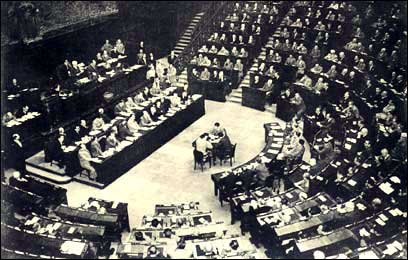Summer is a time for gossip, and the 'scandal' that occurred in Italy in the hot summer of 1950 got the whole country gossiping.
Protagonists: a future President of the Republic and an 'obscene' dress.
This is the 'sundress scandal'. A thread. 🧵
Protagonists: a future President of the Republic and an 'obscene' dress.
This is the 'sundress scandal'. A thread. 🧵

July 20th, 1950. We are in Rome, at the restaurant 'Da Chiarina', a trendy place frequented by MPs, aristocrats and actors. 

Seated at a table, together with two other colleagues, is the future President of the Republic Oscar Luigi Scalfaro. A Christian Democrat deputy, 32 years old, already a widower, a man of deep Catholic faith and strict moral views. 

At another table sits Edith Mingoni-Toussan, a young noblewoman daughter of a retired air force colonel and married to an air force officer, a militant of the far-right Movimento Sociale Italiano party. She is an ardent supporter of the party as well. 

At one point, due to the heat, the woman took off her jacket, remaining dressed only in a sundress, which exposed her shoulders. Scalfaro, at that sight, stood up scandalised and ran towards her. 

"It's disgusting!" exclaimed Scalfaro at the astonished woman "An unworthy and abominable thing! You are disrespecting the place and the people present! If you're dressed like that, it means you're not a decent woman! I order you to put your jacket back on!" 

Umberto Sampietro, another Christian Democrat deputy seated at Scalfaro's table, even told the woman that 'with that dress on she looks like a beast'. 

At the woman's clear refusal, Scalfaro returned to the restaurant accompanied by the Carabinieri. Scalfaro denounced miss Mingoni for obscenities, while the woman denounced Scalfaro and Sampietro for insults. 

The deputies, learning of Mingoni's political sympathies, also threatened to denounce her under the Scelba Law, which prohibits apologia for fascism. 

To give some context, one needs to know that only two years earlier, Interior Minister Mario Scelba had a circular on 'public decency' drawn up.
It was not uncommon to find policemen on beaches measuring the amount of bare skin of women.
It was not uncommon to find policemen on beaches measuring the amount of bare skin of women.

Be that as it may, the 'sundress scandal' was the gossip of that summer: most of the press took the lady's side, while the Catholic newspapers took Scalfaro's side.




The satire, of course, went wild. Here are some examples:
"I would give my life to be able to hold you in my arms all dressed up..."
"I would give my life to be able to hold you in my arms all dressed up..."

In November of that year, the scandal reached the halls of Parliament.
Then, Scalfaro said even graver words: "These women, by daring to expose themselves without any shame, cease to be private women and become public women!"
Then, Scalfaro said even graver words: "These women, by daring to expose themselves without any shame, cease to be private women and become public women!"

At those words, Scalfaro was called upon to fight a duel. First by Miss Mingoni's father, then by her husband, and finally by the woman herself, who was an excellent fencer.
Scalfaro refused, saying that the duel was "against Catholic morality".
Scalfaro refused, saying that the duel was "against Catholic morality".

Probably the reason was another: in Italy, since 1930, duelling had become illegal and Scalfaro, a man of law, knew that he would be committing a crime. 

The refusal to duel unleashed the wrath of the comedian Totò, who in a harsh letter to the socialist daily L'Avanti! publicly called Scalfaro a coward and told him that the 'Catholic morality' was just a pretext not to accept the challenge. 

The trial against Scalfaro and Sampietro, following the woman's complaint for insults, will never take place because in 1953 the President of the Republic Luigi Einaudi signed an amnesty. Then, the scandal fell more or less into oblivion. 

But the 'sundress scandal', which occurred more than forty years earlier and gave him a reputation as a man of strict moral values, was never really forgotten by the press. 

Scalfaro never apologized for that episode, but in private he admitted that he had 'gone too far'.
Edith Mingoni, on the other hand, will always hold a grudge for that episode, which, according to her, 'ruined her life'.
Edith Mingoni, on the other hand, will always hold a grudge for that episode, which, according to her, 'ruined her life'.

• • •
Missing some Tweet in this thread? You can try to
force a refresh

























